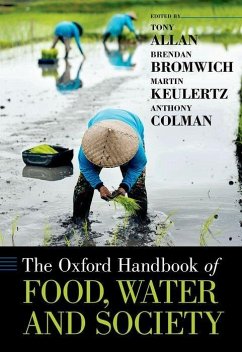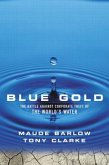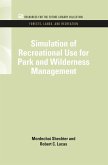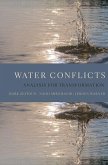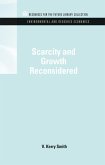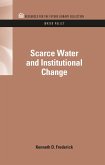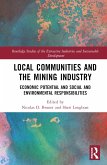Oxford Handbook of Food, Water and Society
Herausgeber: Allan, Tony; Colman, Anthony; Keulertz, Martin; Bromwich, Brendan
Oxford Handbook of Food, Water and Society
Herausgeber: Allan, Tony; Colman, Anthony; Keulertz, Martin; Bromwich, Brendan
- Gebundenes Buch
- Merkliste
- Auf die Merkliste
- Bewerten Bewerten
- Teilen
- Produkt teilen
- Produkterinnerung
- Produkterinnerung
Society's greatest use of water is in food production, which makes farmers central to global environmental management. Current food value chains, however, do not enable farmers to both feed a growing population and steward natural resources. Through a carefully curated collection of articles written by water and food system scientists and professionals, including farmers, this Oxford Handbook considers the interconnected issues of real water in the environment and"virtual water" in food value chains, and investigates society's influence on both. This perspective highlights considerable…mehr
![Blue Gold Blue Gold]() Maude BarlowBlue Gold195,99 €
Maude BarlowBlue Gold195,99 €![Blue Gold Blue Gold]() Maude BarlowBlue Gold61,99 €
Maude BarlowBlue Gold61,99 €![Simulation of Recreational Use for Park and Wilderness Management Simulation of Recreational Use for Park and Wilderness Management]() Mordechai SchechterSimulation of Recreational Use for Park and Wilderness Management113,99 €
Mordechai SchechterSimulation of Recreational Use for Park and Wilderness Management113,99 €![Water Conflicts Water Conflicts]() Mark ZeitounWater Conflicts114,99 €
Mark ZeitounWater Conflicts114,99 €![Scarcity and Growth Reconsidered Scarcity and Growth Reconsidered]() V Kerry SmithScarcity and Growth Reconsidered168,99 €
V Kerry SmithScarcity and Growth Reconsidered168,99 €![Scarce Water and Institutional Change Scarce Water and Institutional Change]() Kenneth D FrederickScarce Water and Institutional Change113,99 €
Kenneth D FrederickScarce Water and Institutional Change113,99 €![Local Communities and the Mining Industry Local Communities and the Mining Industry]() Local Communities and the Mining Industry174,99 €
Local Communities and the Mining Industry174,99 €-
-
-
Hinweis: Dieser Artikel kann nur an eine deutsche Lieferadresse ausgeliefert werden.
- Produktdetails
- Verlag: Hurst & Co.
- Seitenzahl: 944
- Erscheinungstermin: 25. Oktober 2019
- Englisch
- Abmessung: 259mm x 187mm x 62mm
- Gewicht: 1767g
- ISBN-13: 9780190669799
- ISBN-10: 0190669799
- Artikelnr.: 58049410
- Herstellerkennzeichnung
- Libri GmbH
- Europaallee 1
- 36244 Bad Hersfeld
- 06621 890
- Verlag: Hurst & Co.
- Seitenzahl: 944
- Erscheinungstermin: 25. Oktober 2019
- Englisch
- Abmessung: 259mm x 187mm x 62mm
- Gewicht: 1767g
- ISBN-13: 9780190669799
- ISBN-10: 0190669799
- Artikelnr.: 58049410
- Herstellerkennzeichnung
- Libri GmbH
- Europaallee 1
- 36244 Bad Hersfeld
- 06621 890
* List of Contributors
* Introduction
* 1. Food, Water and Society: An Analytical Framework
* Brendan Bromwich, Tony Allan, Anthony Colman, Martin Keulertz
* Part I: Key Concepts
* 2. Green Water Used By Plants And Managed By Farmers: Measurement,
Accounting, Policy
* David Leslie Dent
* 3. Green Water and Food Security
* Garrison Sposito
* 4. Natural Capital Accounting for Water Resources
* Matthew Agarwala, Michael Brock
* 5. Will Irrigation Technology, Pricing, or Quotas Ensure Sustainable
Water Use?
* Chris Perry
* 6. Global food Trade and Local Water Resources: Can We Bridge the
Regulatory Gap?
* Arjen Hoekstra
* 7. Water Service Requirements for Agriculture: Nature, Nurture and
Negotiation
* Carl Hausmann
* 8. Valuing Water in Supply Chains
* Peter Brabeck-Letmathe, Christian A. Vousvouras, Samuel Vionnet
* 9. Valuing Water in Food Systems and Beyond
* Alexis J. Morgan, Stuart Orr, Nathanial Matthews
* 10. Subsidies and the Environment: Impacts of WTO Agricultural
Support Disciplines
* Ulla Kask
* 11. Dietary Patterns that Value People and the Planet
* Joanne Burke
* 12. Incentive Programs to Address the Challenges of Hunger,
Undernutrition, and Obesity in the United States
* Gus Schumacher, Emily Nink
* 13. Farmer-led Water User Associations in Agricultural Water
Management
* Rami Zurayk, Azza Dirar
* 14. Gender, Poverty and Politics Along the Real-virtual Water
Spectrum
* Floriane Clement, Alan Nicol
* 15. The Feminization of Agriculture: Evidence and Implications for
Food and Water Security
* Vanya Slavchevska, Susan Kaaria, Sanna Liisa Taivalmaa
* 16. Societal Drivers of Food and Water Systems 1: Material Flows,
Household Consumption Styles, and Contending Schools of Engineering
Thought
* Michael Thompson, M. Bruce Beck, Dipak Gyawali
* 17. Societal Drivers of Food and Water Systems 2: Applying Plural
Rationality to some Wicked Problems
* M. Bruce Beck, Dipak Gyawali, Michael Thompson
* Part II: Global Problemsheds
* 18. Water and Food in the American West: Lessons from Recent Droughts
in California
* Josué Medellín-Azuara, Jay Lund, Daniel A. Sumner
* 19. Food and Water Security in North America's Transboundary Sonoran
Desert: a Water Exporting Dryland
* America Lutz Ley, Ryan Lee, Yulia Peralta, Christopher Scott
* 20. Water Issues and the Brazilian Agricultural Agenda
* Vanessa Lucena Empinotti
* 21. Water in Australian Agriculture
* James Horne
* 22. Circumventing Water Scarcity in the Jordan Basin: Decoupling
Trends in Israel and Jordan
* Michael Gilmont, Lara Nassar, Erica Harper, Nadav Tal, Steve Rayner
* 23. Food and Water Management in Northwest Africa
* Mustapha Besbes, Jamel Chahed, Abdelkader Hamdane
* 24. Food and Water Management in the Mediterranean Basin
* Michel Petit, Phillipe Le Grusse
* 25. Food and Water Security in West Africa
* Tim Williams
* 26. Food and Water Management in Southern Africa
* Peter Johnston, Arthur Chapman
* 27. Food and Water Security in West Asia
* Eckart Woertz
* 28. Understanding Pesticides in England and Wales: Pathways,
Policies, and Pollution Prevention
* Frances C. Elwell, Nikolaus J. Clemenz, Nicola J. Nineham
* 29. Cape Town's Contested Hierarchy of Demand for Agricultural and
Municipal Water in a Rainfed Economy 2017-18
* Anthony Colman
* Part III: Key Supply Chains
* 30. Global Wheat Value Chains
* Ghada Ahmed
* 31. Water for Coffee
* John Schluter
* 32. Water and Rice Production: Looking to the Future
* Phil Riddell, Biksham Gujja
* 33. Oil Palm Value Chain Management
* Denis Murphy
* 34. Successes and Problems with Measuring Water Consumption in Beef
Systems
* Mieghan Bruce, Camille Bellet, Jonathan Rushton
* Part IV: Responding to the Challenge
* 35. The Potential Impact of Improved Water Management to Alleviate
Water Scarcity and Hunger: A Global Perspective
* Dieter Gerten, Jonas Jägermeyr
* 36. The Global Uptake of Conservation Agriculture and the Impact on
Water-related Ecosystem Services
* Amir Kassam, David Coates
* 37. A Farmer's Experience of Conservation Agriculture in the UK
* Anthony J. Reynolds
* 38. The Variable Rate Irrigation Management Challenge
* James Lowenberg-DeBoer
* 39. The Water Infrastructure Crisis
* Phil Riddell
* 40. Integrating Multi-Capital Thinking into Business Decisions
* Jyoti Banerjee
* 41. Modelling Agricultural Controls for Flooding and Soil Erosion
* Roger Moussa, Bruno Cheviron
* 42. Water Management by Farmers
* Laurence Smith
* 43. The Role of New and Green Water Resources in Localizing Water and
Food Security Under Arid and Semi-Arid Conditions
* Rabi Mohtar, Amjad Assi
* 44. Disruptive Food Supply Chains: Bringing it all Back Home
* Tony Beck
* 45. Lab-grown Meat: Can It Change the World?
* Martin Keulertz
* Conclusions
* 46. Food, Water and the Consequences of Society not Valuing the
Environment
* Tony Allan
* Index
* List of Contributors
* Introduction
* 1. Food, Water and Society: An Analytical Framework
* Brendan Bromwich, Tony Allan, Anthony Colman, Martin Keulertz
* Part I: Key Concepts
* 2. Green Water Used By Plants And Managed By Farmers: Measurement,
Accounting, Policy
* David Leslie Dent
* 3. Green Water and Food Security
* Garrison Sposito
* 4. Natural Capital Accounting for Water Resources
* Matthew Agarwala, Michael Brock
* 5. Will Irrigation Technology, Pricing, or Quotas Ensure Sustainable
Water Use?
* Chris Perry
* 6. Global food Trade and Local Water Resources: Can We Bridge the
Regulatory Gap?
* Arjen Hoekstra
* 7. Water Service Requirements for Agriculture: Nature, Nurture and
Negotiation
* Carl Hausmann
* 8. Valuing Water in Supply Chains
* Peter Brabeck-Letmathe, Christian A. Vousvouras, Samuel Vionnet
* 9. Valuing Water in Food Systems and Beyond
* Alexis J. Morgan, Stuart Orr, Nathanial Matthews
* 10. Subsidies and the Environment: Impacts of WTO Agricultural
Support Disciplines
* Ulla Kask
* 11. Dietary Patterns that Value People and the Planet
* Joanne Burke
* 12. Incentive Programs to Address the Challenges of Hunger,
Undernutrition, and Obesity in the United States
* Gus Schumacher, Emily Nink
* 13. Farmer-led Water User Associations in Agricultural Water
Management
* Rami Zurayk, Azza Dirar
* 14. Gender, Poverty and Politics Along the Real-virtual Water
Spectrum
* Floriane Clement, Alan Nicol
* 15. The Feminization of Agriculture: Evidence and Implications for
Food and Water Security
* Vanya Slavchevska, Susan Kaaria, Sanna Liisa Taivalmaa
* 16. Societal Drivers of Food and Water Systems 1: Material Flows,
Household Consumption Styles, and Contending Schools of Engineering
Thought
* Michael Thompson, M. Bruce Beck, Dipak Gyawali
* 17. Societal Drivers of Food and Water Systems 2: Applying Plural
Rationality to some Wicked Problems
* M. Bruce Beck, Dipak Gyawali, Michael Thompson
* Part II: Global Problemsheds
* 18. Water and Food in the American West: Lessons from Recent Droughts
in California
* Josué Medellín-Azuara, Jay Lund, Daniel A. Sumner
* 19. Food and Water Security in North America's Transboundary Sonoran
Desert: a Water Exporting Dryland
* America Lutz Ley, Ryan Lee, Yulia Peralta, Christopher Scott
* 20. Water Issues and the Brazilian Agricultural Agenda
* Vanessa Lucena Empinotti
* 21. Water in Australian Agriculture
* James Horne
* 22. Circumventing Water Scarcity in the Jordan Basin: Decoupling
Trends in Israel and Jordan
* Michael Gilmont, Lara Nassar, Erica Harper, Nadav Tal, Steve Rayner
* 23. Food and Water Management in Northwest Africa
* Mustapha Besbes, Jamel Chahed, Abdelkader Hamdane
* 24. Food and Water Management in the Mediterranean Basin
* Michel Petit, Phillipe Le Grusse
* 25. Food and Water Security in West Africa
* Tim Williams
* 26. Food and Water Management in Southern Africa
* Peter Johnston, Arthur Chapman
* 27. Food and Water Security in West Asia
* Eckart Woertz
* 28. Understanding Pesticides in England and Wales: Pathways,
Policies, and Pollution Prevention
* Frances C. Elwell, Nikolaus J. Clemenz, Nicola J. Nineham
* 29. Cape Town's Contested Hierarchy of Demand for Agricultural and
Municipal Water in a Rainfed Economy 2017-18
* Anthony Colman
* Part III: Key Supply Chains
* 30. Global Wheat Value Chains
* Ghada Ahmed
* 31. Water for Coffee
* John Schluter
* 32. Water and Rice Production: Looking to the Future
* Phil Riddell, Biksham Gujja
* 33. Oil Palm Value Chain Management
* Denis Murphy
* 34. Successes and Problems with Measuring Water Consumption in Beef
Systems
* Mieghan Bruce, Camille Bellet, Jonathan Rushton
* Part IV: Responding to the Challenge
* 35. The Potential Impact of Improved Water Management to Alleviate
Water Scarcity and Hunger: A Global Perspective
* Dieter Gerten, Jonas Jägermeyr
* 36. The Global Uptake of Conservation Agriculture and the Impact on
Water-related Ecosystem Services
* Amir Kassam, David Coates
* 37. A Farmer's Experience of Conservation Agriculture in the UK
* Anthony J. Reynolds
* 38. The Variable Rate Irrigation Management Challenge
* James Lowenberg-DeBoer
* 39. The Water Infrastructure Crisis
* Phil Riddell
* 40. Integrating Multi-Capital Thinking into Business Decisions
* Jyoti Banerjee
* 41. Modelling Agricultural Controls for Flooding and Soil Erosion
* Roger Moussa, Bruno Cheviron
* 42. Water Management by Farmers
* Laurence Smith
* 43. The Role of New and Green Water Resources in Localizing Water and
Food Security Under Arid and Semi-Arid Conditions
* Rabi Mohtar, Amjad Assi
* 44. Disruptive Food Supply Chains: Bringing it all Back Home
* Tony Beck
* 45. Lab-grown Meat: Can It Change the World?
* Martin Keulertz
* Conclusions
* 46. Food, Water and the Consequences of Society not Valuing the
Environment
* Tony Allan
* Index

